71,000 pages of Canadian Genealogy and History Now Online
 If you have Canadian roots, you’ll want to know about a rich new resource now at Findmypast.com. It’s the Canadian Books collection, with 71,000 pages of keyword-searchable histories, vital records, directories, published genealogies and more.
If you have Canadian roots, you’ll want to know about a rich new resource now at Findmypast.com. It’s the Canadian Books collection, with 71,000 pages of keyword-searchable histories, vital records, directories, published genealogies and more.
“Dating back to the 1600s, the Canadian Books boast 71,000 pages of items such as military, religious, occupational and immigration records, business directories, published genealogies and BMDs [births, marriages and deaths],” states a Findmypast.com press release. “The books feature a sizeable amount of military records with various nominal rolls and rolls of honour relating mostly to the First World War, such as The Royal Montreal Regiment, 14th Battalion, University of Toronto Roll of Service buy heartworm medication online canada 1914-1918 and 31st Canadian Infantry CEF 1914-1919.”
Though the core content is Canada, the reach of this 200-volume collection extends outside Canada’s boundaries. “With titles such as Sketches of Irish soldiers, The Scotch-Irish of California, and German-Canadian Folklore, the collection is valuable for people with Canadian ancestry and those who can trace their origins back to the UK or Europe.”
This collection comes from the Archive CD Books Canada Project, which has gathered, renovated and reproduced Canadian historical books, documents and maps for over a decade. The 200 volumes are searchable through all Findmypast international sites with a World Subscription and in the U.S. and Canada resources at Findmypast.com.
American Slave Records in New and Updated Genealogical Collections
American slave records contained in the Digital Library on American Slavery at the University of North Carolina Greensboro have recently been updated. Also in new and updated genealogical record collections this week, records from Australia, United States, and Ireland.
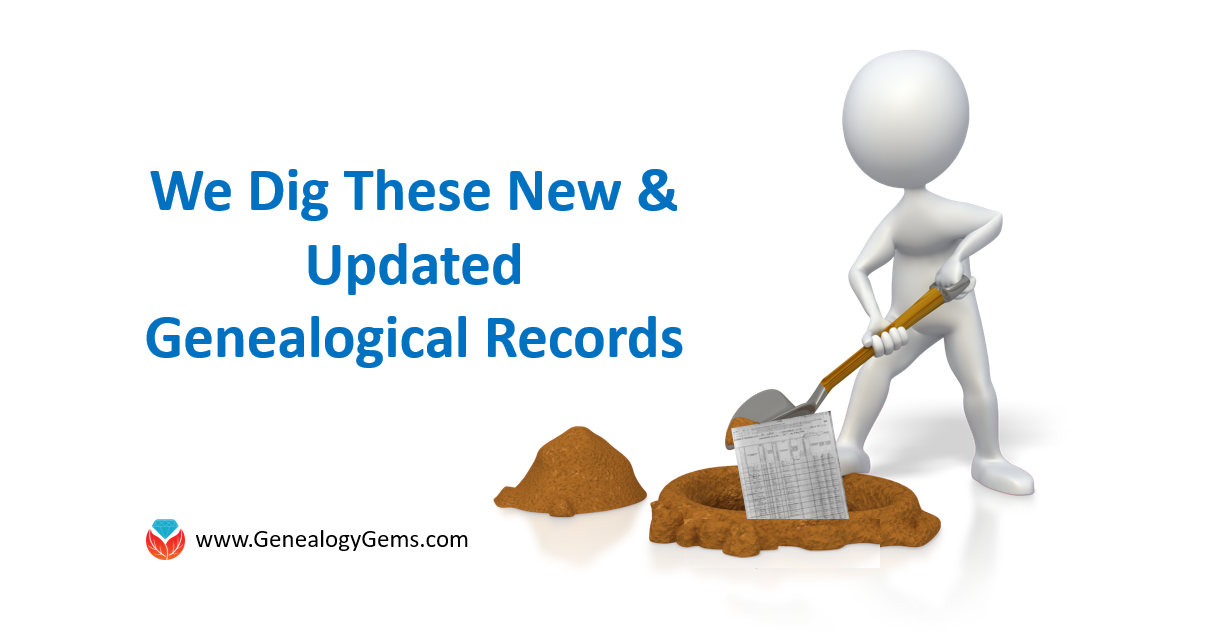
United States – North Carolina – American Slave Records
An expansion of the University of North Carolina Greensboro University Libraries’ Digital Library on American Slavery has added bills of sales. These records index the names of enslaved people from across North Carolina. When complete the project will include high resolution images and full-text searchable transcripts. This digital library also includes other important record projects such as:
Race and Slavery Petitions Project – A searchable database of detailed personal information about slaves, slaveholders, and free people of color. The site provides access to information gathered over an eighteen-year period from petitions to southern legislatures and country courts filed between 1775 and 1867 in the fifteen slave-holding states in the United States and the District of Columbia.
North Carolina Runaway Slave Advertisements, 1750-1840 Project – Online access to all known runaway slave advertisements (more than 2300 items) published in North Carolina newspapers from 1751 to 1840. Digital images, full-text transcripts, and descriptive metadata, are included in this searchable database.
The Trans-Atlantic Slave Trade Database – Among other things, this database identifies 91,491 Africans taken from captured slave ships or from African trading sites. It includes the African name, age, gender, origin, country, and places of embarkation and disembarkation of each individual.
People Not Property – Slave Deeds of North Carolina – When complete, People Not Property – Slave Deeds of North Carolina will include high resolution images, and full-text searchable transcripts. Though still in the working stages, they hope to open the project to states beyond North Carolina, creating a central location for accessing and researching slave deeds from across the Southern United States. Keep a watchful eye on this exciting endeavor!
Australia – Victoria – Court Session Records
Over 3 million Victoria Petty Sessions Registers records have just been released in association with Public Records Office Victoria to coincide with Australia Day (January 26th) 2017. This collection includes both transcripts and scanned images of original court registers. If your ancestors had a run-in with the law, you may find them here.
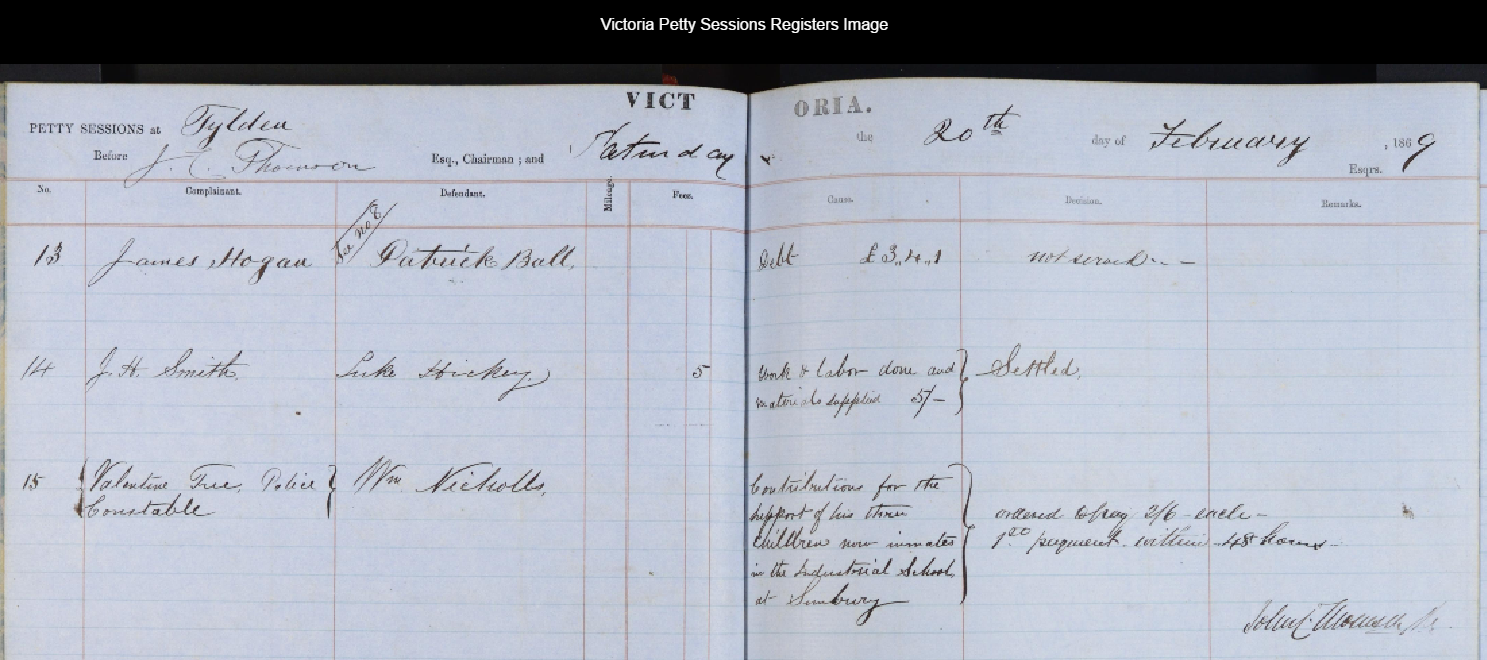
Snapshot of Victoria Petty Sessions Record from Findmypast.
This collection covers both civil and minor criminal cases. The Court of Petty Sessions’ brief was wide, making these records a powerful resource for those with Australian ancestors. Your ancestors may appear as a witnesses, defendants, complainants, or even as a Justice of the Peace. Cases include merchants who had not paid duty on their goods, to workers suing for unpaid wages. Debts were also collected and disputes settled. Public drunkenness was a common offence, as was assault and general rowdiness.
The registers available in this collection cover the years between 1854 and 1985. Transcripts will list the event date, your ancestor’s role (whether plaintiff, defendant, etc.), cause or reason for the case, the court it was held at, the date, and a brief description. Images may provide additional details.
Australia – Queensland – Passenger Lists
Also at Findmypast, Queensland Custom House Shipping 1852-1885 passengers and crew with over 107,000 records of passengers and crew that made voyages between 1852 to 1885.
These transcripts list information taken from original documents held by the National Archives of Australia and will allow you to discover your ancestor’s age, nationality, occupation, date and port of arrival, date and port of departure, and the name of the ship they sailed on.
United States – New York – Passenger Lists
United States – Ohio – Tax Records
The records included in the Ohio Tax Records, 1800- 1850 at FamilySearch contain both the index and images to taxation records as recorded with the County Auditor of each county. The records in this collection cover the years 1800 to 1850. However, the majority are from the years 1816 through 1838. Entries are recorded in voucher books and one person per page. Included are the following Ohio counties:
- Ashtabula
- Belmont
- Carroll
- Columbiana
- Guernsey
- Harrison
- Jackson
- Jefferson
- Monroe
- Trumbull
- Washington
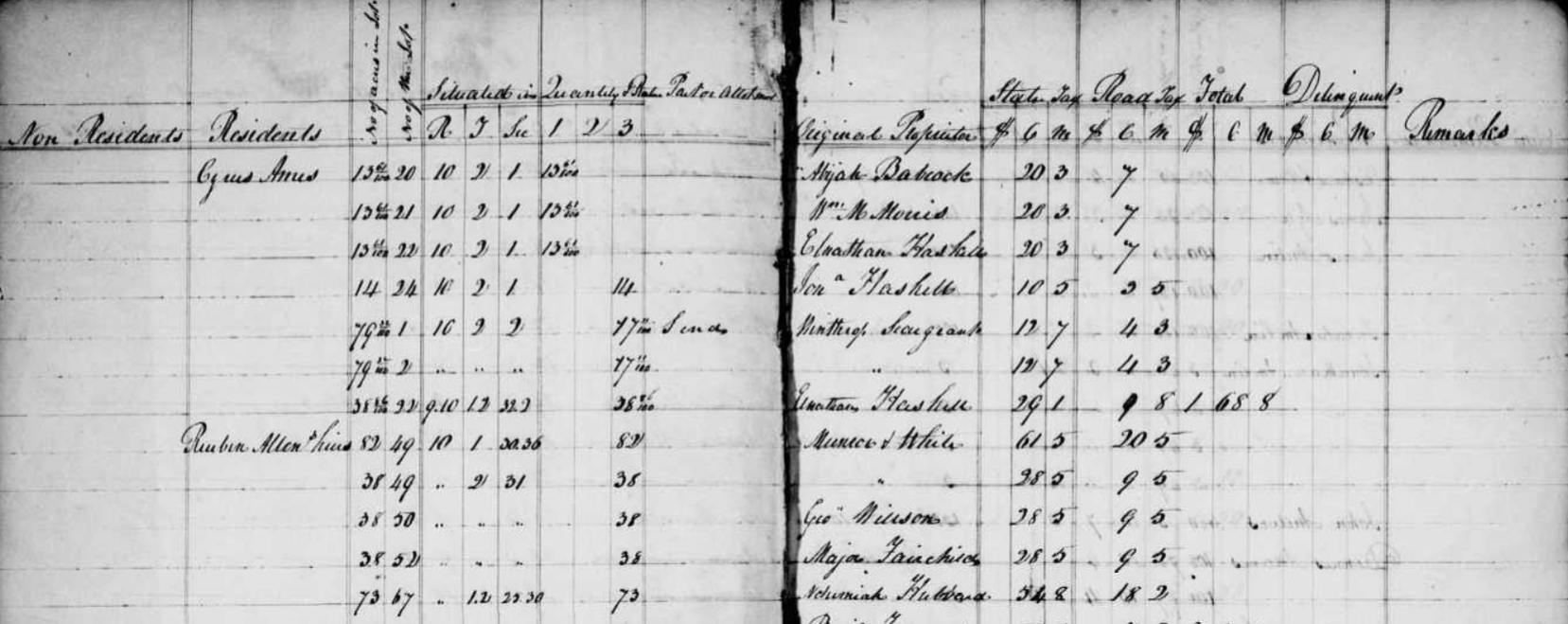
Snapshot of an Ohio Tax Record via FamilySearch.org
Governments created tax records that vary in content according to the purpose of the assessment. Most are based on personal property, real estate, and income. They are particularly useful for placing your ancestor in a particular area year after year, hopefully leading you to other helpful records.
United States – Massachusetts – Revolutionary War Index Cards
FamilySearch has updated the Massachusetts, Revolutionary War, Index Cards to Muster Rolls, 1775-1783 collection this week. These index card abstracts are of accounts, muster and pay rolls, and descriptive lists and accounts, of soldiers who served in Massachusetts companies and regiments during the Revolutionary War, 1775-1783.
Examples of Card Abstract Types
- An Account -Mass. Archives Depreciation Rolls
- Company Return – Coat Rolls Eight Months Service
- Continental Army Pay Accounts – Continental Army Books
- A Descriptive List – Mass. Muster and Pay Rolls
- Lexington Alarm Roll – Lexington Alarms
- List of Men Mustered – Mass. Muster and Pay Rolls
- List of Men Raised to Serve in the Continental Army
- Muster and Pay Roll
- Muster
- Order for Bounty Coat – Coat Rolls Eight Months Service Order
- Order – Mass. Muster And Pay Rolls
- Pay Abstract – Mass. Muster and Pay Rolls
- Pay Roll
- Receipt for Bounty – Mass. Muster and Pay Rolls
- A Return
- Statement of Continental Balances
Ireland – Newspapers
This month’s enormous Irish Newspapers update at Findmypast contains over 1.2 million articles. Seven brand new titles have also been added including the Leinster Leader, Donegal Independent, Kildare Observer & Eastern Counties Advertiser, Wicklow News-Letter & County Advertiser, Longford Journal Wicklow People, and the Ballyshannon Herald.
Newspapers are a great source for vital information when records cannot be found. To learn more about using newspapers for genealogy research, read Lisa Louise Cooke’s top-notch tips in Everything You Need to Know About How to Find Your History in Newspapers.
Official Military Personnel Files for US Military Ancestors in WWI, WWII and Beyond
Official Military Personnel Files (OMPFs) are 20th and 21st U.S. military records for conflicts such as WWI, WWII, and beyond. OMPFs are packed with great genealogy clues, but millions were destroyed by a 1973 fire. Here’s how to find what records still remain, and what you might find if your relative’s OMPF went up in flames.

What are Official Military Personnel Files?
If your ancestor served in the U.S. military during the 20th or 21st century, related service records are called Official Military Personnel Files (OMPFs), or sometimes “201 files,” named after the brown file folder that holds them. These are available for each of the military branches: Army, Navy, Air Force, Marines, and Coast Guard. They are generally held at the National Personnel Record Center in St. Louis, Missouri. (Exceptions for veterans discharged since 1995 may be at other government offices.)
According to the National Archives, Official Military Personnel Files are “primarily an administrative record, containing information about the subject’s service history such as: date and type of enlistment/appointment; duty stations and assignments; training, qualifications, performance; awards and decorations received; disciplinary actions; insurance; emergency data; administrative remarks; date and type of separation/discharge/retirement; and other personnel actions.” The level of detail in complete files make them invaluable genealogical records.
How to Access Official Military Personnel Files
On July 12, 1973, a disastrous fire ravaged the building where the OMPFs were housed. Between 16 and 18 million personnel files were destroyed or damaged; these affected names alphabetically after James E. Hubbard. It was a serious loss for two particular branches of the military:
- Army Personnel discharged 1912-1960: 80% Loss (4 in every 5 files).
- Air Force Personnel discharged 1947-1964: 75% Loss (3 in every 4 files). (Remember: the Air Force wasn’t officially organized until September 14, 1947. Before this date Air Force records were part of the United States Army Air Corps, then part of the U.S. Army.)
The Navy, Marines, and Coast Guard records were largely unaffected by the fire.
Surviving OMPFs and reconstructed records relating to destroyed files are considered to be archival (or open to researchers without restrictions) 62 years after the date of discharge. This is a rolling date, so discharge dates of 1955 and earlier are open to the public. In 2018, that date will change to 1956, and so on. More recent records are considered non-archival and subject to restrictions; only the veteran or next-of-kin have full access to the files.
You can access Official Military Personnel Files in three ways:
1. Go to St. Louis in person. Appointments are recommended, as research space is limited. Click here for information about requesting an appointment, the availability of records, copy fees, and hours of operation.
2. Employ an independent researcher. Click here for the National Archives’ list of researchers.
3. Request records by mail. Here’s a link to the online portal for requesting these records; here’s a direct link to the PDF format of Standard Form 180, which you can print and mail in.
My grandfather’s OMPF: What survived?
I didn’t fully grasp how many records were lost in the fire in 1973 until I ordered a record of one of my family members. When my grandfather Richard Keller was a small child, he received postcards from his great Uncle Zerbe Howard: I remember him. He died when I was 10 years old. Zerbe served during World War I and was a resident of Lebanon, PA.

I have in my possession the 2 postcards sent my grandfather that listed his name, rank, and military unit. I ordered his file which took several months, and when it arrived I expected it to be full of information. Unfortunately, his file was completely destroyed.
The only reconstructed records located were three pages recording him on a final payment roll with other men from his unit. Here’s an image of that record, which seems so sparse compared to what that original OMPF may have contained:
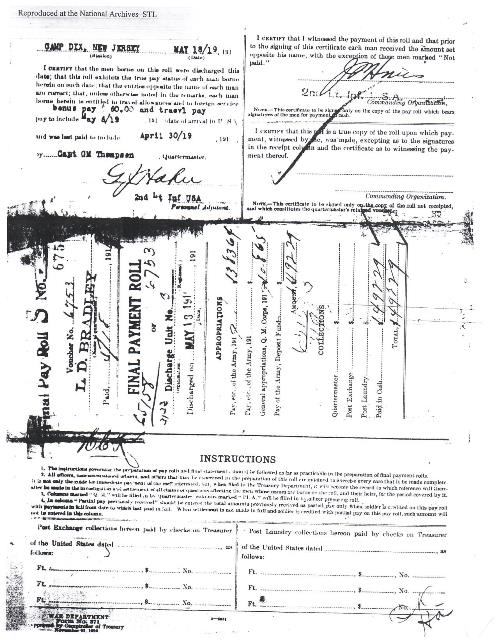
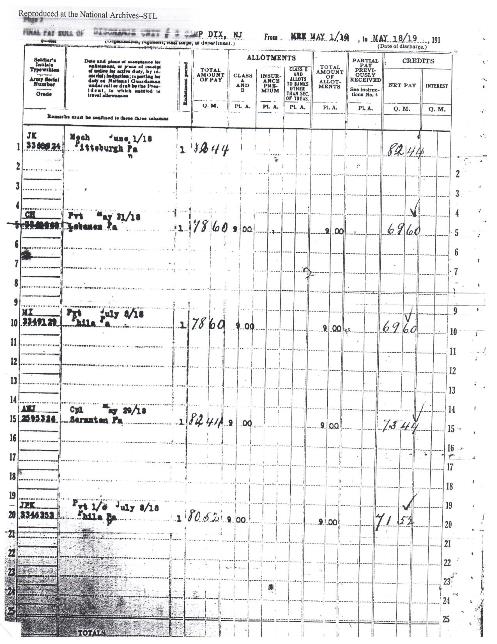
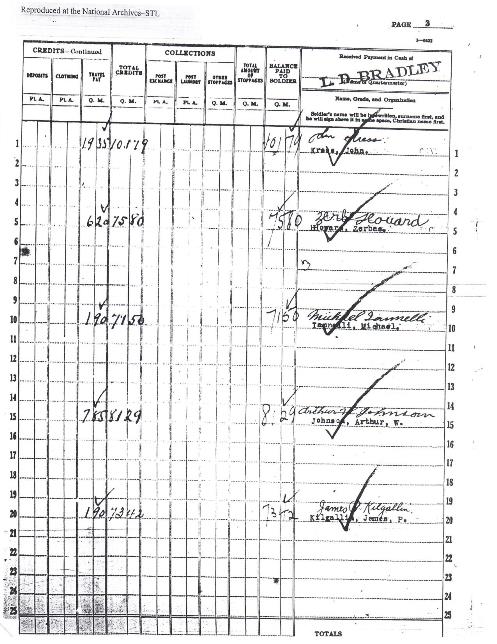
This final payment roll from Camp Dix, New Jersey is dated from April 1918 to May of 1919. It reveals that the soldiers on this roll were discharged on this date, that they were entitled to travel allowance and foreign service bonus pay of $60 and what their individual payments were. Zerbe even appears to have signed the record in his own scrawling handwriting. While it may be discouraging to have such limited information available due to the 1973 fire, it’s still worth pulling records such as these to track your military ancestors.
The National Personnel Record Center now has other records available to researchers to help fill in some of the gaps. For example, the Army filed Morning Reports, organized by unit. I also found local records in Pennsylvania that were not in the hands of the federal government. Listen to the free Genealogy Gems Podcast or come back to this blog for future tips on researching your 20th-century U.S. relatives’ military service.
Looking for 19th century US military records?
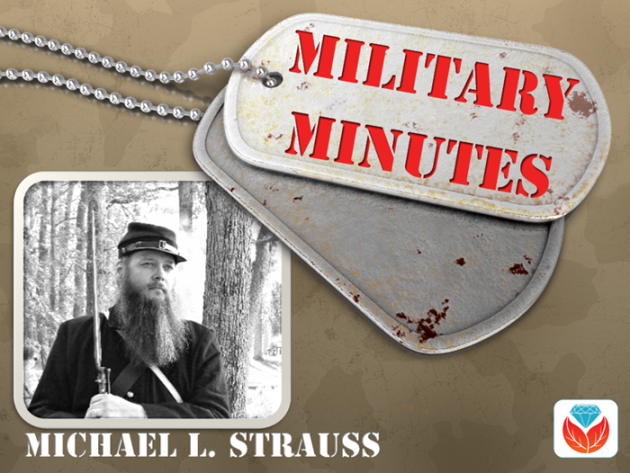 If your ancestor served in the military during the 1800s or earlier, you’ll want to look for his Compiled Military Service Records at the National Archives in Washington, DC. The exact dates for each military branch vary in years accordingly. Click here to learn more about those.
If your ancestor served in the military during the 1800s or earlier, you’ll want to look for his Compiled Military Service Records at the National Archives in Washington, DC. The exact dates for each military branch vary in years accordingly. Click here to learn more about those.
For more ongoing training in tracing your military ancestors, tune in to the free Genealogy Gems Podcastand listen for my segment, “Military Minutes.”
